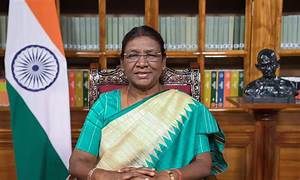
President Murmu: True Empowerment Lies in Recognising People’s Rights

 :
| Updated On: 10-Sep-2025 @ 9:59 am
:
| Updated On: 10-Sep-2025 @ 9:59 amSHARE
On Tuesday, President Droupadi Murmu emphasised that true empowerment for tribal communities comes not merely from government schemes but through the recognition and protection of their rights. She strongly advocated for the speedy resolution of pending claims under the Forest Rights Act (FRA), calling it an important instrument for ensuring social justice, equality, and environmental protection.
The President made these remarks during a meeting with a group of tribal leaders from different states at Rashtrapati Bhavan. The delegation was part of the Adi Karmayogi Abhiyan, an initiative launched by the Ministry of Tribal Affairs. Starting in July, five such meetings were scheduled with eminent personalities from tribal communities, and this gathering marked the final session of the series.
In her address, President Murmu explained the vision of the Adi Karmayogi Abhiyan, which focuses on dialogue, cooperation, and collaborative action to shape the future of both tribal society and the nation. She stated that the initiative reflects India’s collective resolve to build an inclusive and equitable society. Stressing the importance of tribal participation, she said that tribal communities should not only remain beneficiaries of government programmes but should also act as co-creators of the nation’s future.
She highlighted that since its launch, the initiative has been extended to one lakh villages across India, where nearly 20 lakh “adi-karmayogis” have been mobilised. This diverse group includes government officials, volunteers, women from self-help groups, and tribal youth. Collectively, the programme aims to reach out to an estimated 11 crore tribal citizens, helping them access opportunities for progress and ensuring their voices are heard in decision-making processes.
Speaking specifically about the Forest Rights Act, President Murmu underscored its significance beyond being a legal framework. She described it as a powerful tool for achieving justice, equality, and environmental balance, emphasising that it helps foster harmony between people and forests. She urged all relevant stakeholders—government bodies, administrators, and community leaders—to expedite the resolution of pending claims under the FRA and ensure that ownership rights are digitised. According to her, digitisation will provide security and transparency in recognising and protecting tribal land rights.
President Murmu reiterated that real empowerment is not limited to welfare schemes. Instead, it comes from acknowledging and respecting the inherent rights of communities, ensuring their active representation in governance, and fostering participation in shaping national development. She encouraged tribal leaders to play a proactive role in their communities’ development, to voice their concerns on public platforms, and to hold systems accountable.
The President also highlighted the role of technology in tribal empowerment. She drew attention to the recent launch of Adi Vaani, an AI-based translation tool for tribal languages. Launched in September 2025 in its beta version, Adi Vaani is the world’s first AI-powered indigenous language bridge tool. It uses artificial intelligence (AI) and machine learning (ML) to facilitate cultural preservation and social inclusion of tribal groups in India. She described it as a landmark step in transforming language and education in tribal areas, helping bridge communication gaps while preserving linguistic heritage.
In conclusion, President Murmu’s message reinforced that empowerment of tribal communities requires a rights-based approach, respect for their identity, and inclusion in nation-building. By combining legal recognition of rights, mobilisation under initiatives like Adi Karmayogi Abhiyan, and technological innovations such as Adi Vaani, India can move towards an inclusive and equitable future that acknowledges the contributions and aspirations of its tribal citizens.